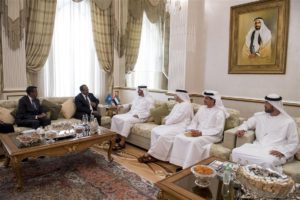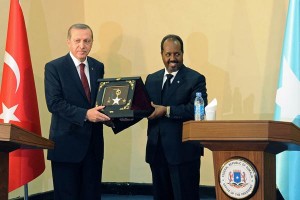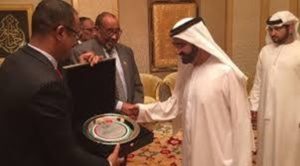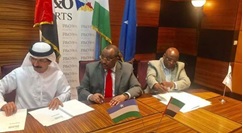By Faisal Roble
When Yesterday Resembles Today
As President Mohamed Abdullahi Farmajo settles down in Villa Somalia with his outsized cabinet watching over empty coffers, he encounters a political landscape that resembles the era of “Scramble for Africa,” and the dismemberment of Somali territory. Between 1884 and 1887, Somali strategic ports were all in the hands of three different European colonial powers. Similarly, between 2014 and 2017, three mega investors have taken over the development and management of three of Somalia’s most important ports. Somalia is back to where it was 130 years ago, only this time overpowered by a much crueler world.
Just like his predecessor, Farmajo’s presidency already shows extreme dependency on Arab petro-dollar and Western benefactors. His promise to bring back Somalia’s sovereignty proves to be no more than yet another politician’s humbug.
 The omnipresent foreign interference in all affairs of Somali by foreign powers has recently peaked on April 10, 2017, when members of the Somalia National Army (SNA) clashed with soldiers from the National Intelligence and Security Agency (NISA). It is reported that SNA is funded and trained by the United Arab Emirates UAE, while the nation’s security wing is loyal to Qatar. The temporal Arab cold war, which has been raging for some time now, is hence fought in Mogadishu’s dusty streets with the Somali government only playing spectator’s role.
The omnipresent foreign interference in all affairs of Somali by foreign powers has recently peaked on April 10, 2017, when members of the Somalia National Army (SNA) clashed with soldiers from the National Intelligence and Security Agency (NISA). It is reported that SNA is funded and trained by the United Arab Emirates UAE, while the nation’s security wing is loyal to Qatar. The temporal Arab cold war, which has been raging for some time now, is hence fought in Mogadishu’s dusty streets with the Somali government only playing spectator’s role.
On April 10, 2017, Farmajo was summoned for consultation to Dubai on a range of issues mainly on the ports deals, whereas Qatari Amir was visiting Addis Ababa in a highly publicized mutual consultations with the powerful ancient empire of Ethiopia. The cornerstone of Ethiopia’s foreign policy has been and is the destabilization of Somalia.
Somalia has three major challenges to its post-civil war reconstruction: security, economic, and political. The security sector has been elusive for the last quarter of a century following the 1991 civil war. President Farmajo has promised to eradicate and destroy Al Sahbab in two years.This promise is nothing more than Mr. Farmajo’s bravado; who is known to be hasty. Otherwise, most military analysists would die to have a peek into his war game.
Whether Mr. Farmajo’s hastiness makes sense or not, Somalia needs its own national army to fight its own war for the re-liberation of the country. Foreign powers such as Ethiopia, Kenya and Qatar on one side, and the UAE, Saudi Arabia, Turkey, and Egypt on the other side make the reconstruction of Somalia’s national army all the more difficult to realize.
Politics of Ports Economy
In an era when farming remains fallow and livestock-based economy stagnated due to diseases or lack of export markets, conflict over resources has shifted to renting port resources to foreign entities. There is a renewed interest in the nation’s ports as economic engine, leading to a rush to rent them. Such a rush is directly related to a weak central government and ever bold regions; this new paradigm of renting Somalia’s last resource frontier – ports, therefore, must be read within the context of the center-periphery push forces that have been a mainstay since the debacle of the Somali state. These push forces are expressed in a unilateral secession in the case of Somalia. In other cases, push force manifested themselves as autonomous regional governments as the case is with Puntland, Jubbaland, Southland, Galmudug, or elsewhere.
To date, Somalia’s largest ports (Mogadishu, Berbera and Bossaso) are all rented out and their respective managements have been transferred to foreign investors. All these is done as a form of what political scientists call rent-seeking mechanisms by weak states ala that of Somalia.

Whereas Turkey’s Albayrak Company has been managing Mogadishu’s port since September, 2014, both Berbera and Bossaso are rented to two famous Dubai-based companies in September 2016 and April, 2017, respectively. The Turkish deal was sponsored and benefited by Villa Somalia with less opposition by the Somali parliament at the time (Turkish Company Favori LLC took over the management of Mogadishu’s Adan Abdulle Osman International airport on Mogadishu airport on September 15, 2013).
However, the newly seated federal parliament expressed its vocal displeasure on how both Somaliland and Puntland circumvented the nation’s legislative body for approval of their respective deals. Yet, both the government of former President Hassan sheikh Mohamoud and that of Mohamed Abdullahi Farmajo gave their unpublicized approval to both deals. Moreover, Somaliland’s and Puntland’s regional parliaments unanimously gave approval of the deals.
On April 11, 2017, a well-placed member of Somaliland’s upper house told me that the outgoing President Hassan Sheikh Mohamoud was fully supportive of the DP World-Somaliland deal, while former Prime Minister Omar Sharmarke did all the ground for Bossaso’s deal. To seal the deal for good, a high ranking officer in Puntland told me that President Farmajo assured Puntland’s speaker of the Parliament that his government will not challenge the Bossaso deal.
In both instances, the former President, whose runaway corruption alarmed even his key supporters, including the UK, used such deals as political horse trading for his botched bid for a second term (see Wardheernews, February 2017, Britain’s Briefing Paper on Somalia). So did former Prime Minister Sharmarke (Xasan Sheekh arinta Bosaaso Cumar Cabdi Rashiid ayuu uga dambeeyey).
All of the competing centers of power in Somalia, i.e., Mogadishu, Hargeisa, and Garowe, got what they wanted out of the rush to rent port resources. In the case of Mogadishu, the port is rented to Albayrak; Berbera is rented to the Dubai-based DP World, while Bossaso is rent to another Dubai-based P&O ports.
 Between Albayrak and Villa Somalia, there is an agreed revenue sharing from the port where 55% would go to the Somali authority, and the remaining 45% will be cashed in by Albayrak. Since 2014, the revenue driven from this deal reportedly stayed in and consumed by Mogadishu under the supervision of Villa Somalia. This plus Villa Somalia’s repeatedly refusal to equitably share international aid with regional governments in effect sent a tacit message to the regions – they are left to their own devises.
Between Albayrak and Villa Somalia, there is an agreed revenue sharing from the port where 55% would go to the Somali authority, and the remaining 45% will be cashed in by Albayrak. Since 2014, the revenue driven from this deal reportedly stayed in and consumed by Mogadishu under the supervision of Villa Somalia. This plus Villa Somalia’s repeatedly refusal to equitably share international aid with regional governments in effect sent a tacit message to the regions – they are left to their own devises.
It is this very cavalier and inconsiderate attitude adopted by the center that in turn has triggered the rush to renting Somalia’s ports in retail form by regional leaders. As far as Berbera port is concerned, DP World would invest about $442 million in modernizing port facilities. According to Wall Street Journal, “the Somaliland concession lasts for 30 years, with a 10-year automatic extension. The company will own 65% of a joint venture with the government of Somaliland to manage and invest in the port.”
A member of Somaliland Gurti (upper house) who wants to remain anonymous informed me that Somaliland authorities are scrambling to find about $157 million dollar of their share per the agreement of the concession. He added that no one in Hargeisa knows as of yet where and how to produce about $157 million to effectuate this deal. Whether this is true or not, the leaders of Somaliland have so far publicized the economic benefits, some of them multipliers effects, to be driven from the deal.
Only several hundred miles to the east of Berbera lies the commercially significant port of Bossaso. Like Mogadishu and Hargeisa, Garowe authorities struck a deal with the Dubai-based firm, P&O ports; P&O ports is another UAE-owned international firm that specializes in Ports management. “According to the agreement, P&O sealed with Garowe a 30-year concession for the management and phased development/modernization of Bossaso port facility, comprising about $136 million for phase 1, and a subsequent $ 200 million for phase 2. The details of the cost of construction, expansion and modernization of the port is not revealed.
Like Somaliland, Puntland authorities thus far promoted its deal as a major jumpstarted of its moribund local economy; if all goes as planned, benefits accruing to the residents of the region will be in employment, providing clean drinking water for humans/cattle, establishment of mobile medical services, development of regional fisheries industry (Fish processing in Bossaso for export), development of Free Zone, and development of general community welfare. How much of these positive multipliers effects would materialize remains to be seen.
 Reliable sources close to Garowe assured me that President Mohamed Abdullahi Farmajo accepted the transfer of managing these ports to DP world and P&O firms. Unconfirmed but plausible reports abound in Mogadishu that the silence of the Farmajo’s government came with a price tag of an alleged $100 million given to his government by the Amir of UAE. More money is promised in the coming months.
Reliable sources close to Garowe assured me that President Mohamed Abdullahi Farmajo accepted the transfer of managing these ports to DP world and P&O firms. Unconfirmed but plausible reports abound in Mogadishu that the silence of the Farmajo’s government came with a price tag of an alleged $100 million given to his government by the Amir of UAE. More money is promised in the coming months.
There is nothing to disprove this allegation yet. To the contrary, it looks more credible when one looks at how Farmajo has officially thus far suspended his loud voice and humbug promises regarding Somalia’s sovereignty, one of the slogans upon which he had campaigned.
Less has been said or written about the renting, or at least transferring, of the management of Mogadishu port to Turkish company, let alone any criticism leveled against the transfer of the country’s historic international airport to Turkey. On the contrary, much publicized outcries and criticisms, at times quick condemnations, have been leveled against both Somaliland’s and Puntland’s deals.
Despite which side is right, and I don’t think either side to the rush to rent Somalia’s ports is right, national debate has burst at the seams. It is certain that all these uncoordinated deals are stabs one at a time into the heart of Somalia’s sovereignty. It is also a bitter testimony about the reality that Villa Somalia has become irrelevant to the overall economy of the country. To the chagrin of centrist forces, Villa Somalia’s reach for all intents and purpose does not go beyond Balcad to the north and Afgoi to the west.
If external forces don’t respect your sovereignty, one may postulate and convery this message to Villa Somalia, deals like these ones regarding Somalia’s ports will continue unabated. Whether deals by Kismanyo or Marcca would follow suit is difficult to predict.
The Way out and the Need for Cohesive Constitution
The scramble for Somalia’s ports is underway This is happening 130 years after the infamous Berlin conference took place in 1884 and dismembered the Somali nation state. The repeat of this painful history is a direct function of the absence of a cohesive contractual agreement between Villa Somalia-based Federal government and its subsidiary regional states. If any solution could be found to curtail the rush to mortgaging Somalia’s ports, it better come from a constitutional process where all stakeholders agreed on what is good for the greater good. Completing the revision and ratification of the stalled Federal constitution in a transparent and participatory way is needed now more than anytime.
Completing the ratification of the draft constitution could afford the nation an opportunity to gauge, streamline and confirm the respective roles and responsibilities of each layer of the nation’s governing bodies (center vs periphery), as well as clearly define resource/revenue sharing.
Hassan Sheikh Mahmoud’s administration intentionally threw a cold blanket on the constitution and deliberately reneged on its leadership to fashion an equitable system of resource/revenue sharing for the whole country. In the minds of many Somalis, this very belligerence of the federal government led to the current pulverization of the country. Others may pay a blind eye to the actions of Villa Somalia and blame what appears to be reckless regional leaders such as those in Puntland and Somaliland.
Enough blame has been thrown around. To move forward, a ratified constitution with clear roles and mandates for all sides could minimize the impact of push factors and may help ameliorate the ever-widening gap between the center and the periphery.
One can only hope that the process of constitution ratification be a Somali-led process. In the years leading to the drafting of the 2012 constitution, foreign hands, including but not limited to the UN, AMISOM, and neighboring countries dominated both constitution-making and the ensuing process. Some of us recall how UN and AMISOM representative dominated discussions on conventions organized for the diaspora communities.
This time around, no matter how cash-poor the country is, Somalia’s leaders shall not give foreign entities, especially what colloquially came to be known as the 6th clan in power sharing (beesha lixaad) a free hand to dictate and manipulate the process of constitution ratification.
The Ministry for Constitution and Federal Affairs shall always remember what the late Abdirazak Haji Hussein told Emperor Haile Selassie of Ethiopia who offered a free plane to Somali delegates to Addis Ababa to participate at the founding convention of OAU. Abdirazak said: no thank you; if we have to walk we will do so and show up at the convention no matter what.
There should to be a national will to tell Somalia’s benefactors that this tired and troubled nation’s political process, the constitutional ratification of the draft in particular, is off limits to either Arab petrol-dollar, or to the rich Northern countries of Europe. At least the making of Somalia’s contract among its stakeholders should be a Somali-owned process.
There is an opportunity to bring all stakeholders onboard in order to design an unambiguous and predictable formula for resource/revenue sharing from all sectors of the economy. Neither Mogadishu nor the regions should dominate the process; there is a need to design a system that promotes reciprocity and prioritization prevailing and concrete needs across the nation.
Ratifying the stalled constitution represents an opportunity to bring back stakeholders and possibly minimize the tenuous relationship between the center and the periphery. Then a Somali-centered policies regulating foreign investments and resource sharing can be collectively designed.
Faisal Roble
Email:[email protected]
—
Faisal Roble, a writer, political analyst and a former Editor-in-Chief of WardheerNews, is mainly interested in the Horn of Africa region. He is currently the Principal Planner for the City of Los Angeles in charge of Master Planning, Economic Development and Project Implementation Division.
We welcome the submission of all articles for possible publication on WardheerNews.com. WardheerNews will only consider articles sent exclusively. Please email your article today . Opinions expressed in this article are those of the author and do not necessarily reflect the views of WardheerNews.
WardheerNew’s tolerance platform is engaging with diversity of opinion, political ideology and self-expression. Tolerance is a necessary ingredient for creativity and civility.Tolerance fuels tenacity and audacity.
WardheerNews waxay tixgelin gaara siinaysaa maqaaladaha sida gaarka ah loogu soo diro ee aan lagu daabicin goobo kale. Maqaalkani wuxuu ka turjumayaa aragtida Qoraaga loomana fasiran karo tan WardheerNews.
Copyright © 2024 WardheerNews, All rights reserved


